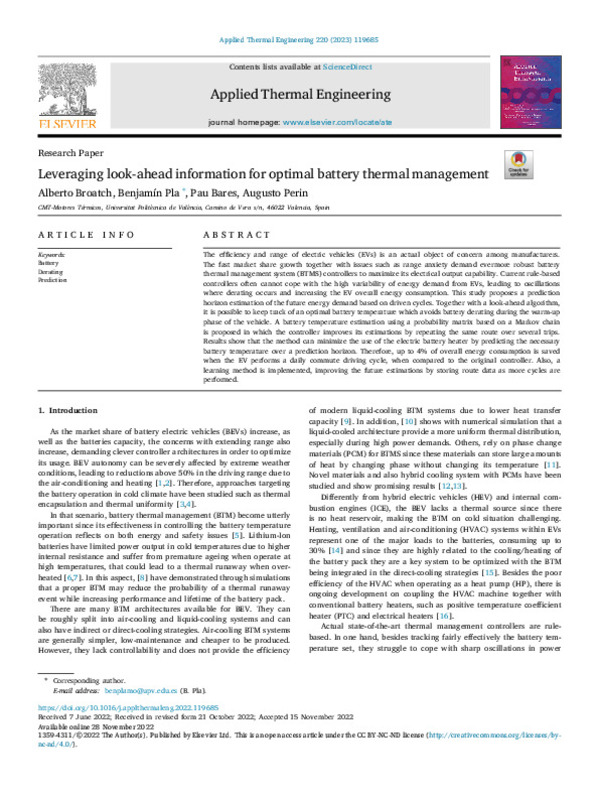JavaScript is disabled for your browser. Some features of this site may not work without it.
Buscar en RiuNet
Listar
Mi cuenta
Estadísticas
Ayuda RiuNet
Admin. UPV
Leveraging look-ahead information for optimal battery thermal management
Mostrar el registro sencillo del ítem
Ficheros en el ítem
| dc.contributor.author | Broatch, A.
|
es_ES |
| dc.contributor.author | Pla Moreno, Benjamín
|
es_ES |
| dc.contributor.author | Bares-Moreno, Pau
|
es_ES |
| dc.contributor.author | Trintinaglia-Perin, Augusto
|
es_ES |
| dc.date.accessioned | 2024-04-11T07:56:21Z | |
| dc.date.available | 2024-04-11T07:56:21Z | |
| dc.date.issued | 2023-02-05 | es_ES |
| dc.identifier.issn | 1359-4311 | es_ES |
| dc.identifier.uri | http://hdl.handle.net/10251/203330 | |
| dc.description.abstract | [EN] The efficiency and range of electric vehicles (EVs) is an actual object of concern among manufacturers. The fast market share growth together with issues such as range anxiety demand evermore robust battery thermal management system (BTMS) controllers to maximize its electrical output capability. Current rule-based controllers often cannot cope with the high variability of energy demand from EVs, leading to oscillations where derating occurs and increasing the EV overall energy consumption. This study proposes a prediction horizon estimation of the future energy demand based on driven cycles. Together with a look-ahead algorithm, it is possible to keep track of an optimal battery temperature which avoids battery derating during the warm-up phase of the vehicle. A battery temperature estimation using a probability matrix based on a Markov chain is proposed in which the controller improves its estimations by repeating the same route over several trips. Results show that the method can minimize the use of the electric battery heater by predicting the necessary battery temperature over a prediction horizon. Therefore, up to 4% of overall energy consumption is saved when the EV performs a daily commute driving cycle, when compared to the original controller. Also, a learning method is implemented, improving the future estimations by storing route data as more cycles are performed. | es_ES |
| dc.description.sponsorship | This research has been partially funded by the Agencia Valenciana de la innovación, Spain through the project INNEST/2021/120, entitled 'Demostrador Tecnológico de un paquete de baterias para vehiculo eléctrico'. | es_ES |
| dc.language | Inglés | es_ES |
| dc.publisher | Elsevier | es_ES |
| dc.relation.ispartof | Applied Thermal Engineering | es_ES |
| dc.rights | Reconocimiento - No comercial - Sin obra derivada (by-nc-nd) | es_ES |
| dc.subject | Battery | es_ES |
| dc.subject | Derating | es_ES |
| dc.subject | Prediction | es_ES |
| dc.subject.classification | INGENIERIA AEROESPACIAL | es_ES |
| dc.subject.classification | MAQUINAS Y MOTORES TERMICOS | es_ES |
| dc.title | Leveraging look-ahead information for optimal battery thermal management | es_ES |
| dc.type | Artículo | es_ES |
| dc.identifier.doi | 10.1016/j.applthermaleng.2022.119685 | es_ES |
| dc.relation.projectID | info:eu-repo/grantAgreement/AVI//INNEST%2F2021%2F120/ | es_ES |
| dc.rights.accessRights | Abierto | es_ES |
| dc.contributor.affiliation | Universitat Politècnica de València. Escuela Técnica Superior de Ingeniería del Diseño - Escola Tècnica Superior d'Enginyeria del Disseny | es_ES |
| dc.description.bibliographicCitation | Broatch, A.; Pla Moreno, B.; Bares-Moreno, P.; Trintinaglia-Perin, A. (2023). Leveraging look-ahead information for optimal battery thermal management. Applied Thermal Engineering. 220. https://doi.org/10.1016/j.applthermaleng.2022.119685 | es_ES |
| dc.description.accrualMethod | S | es_ES |
| dc.relation.publisherversion | https://doi.org/10.1016/j.applthermaleng.2022.119685 | es_ES |
| dc.type.version | info:eu-repo/semantics/publishedVersion | es_ES |
| dc.description.volume | 220 | es_ES |
| dc.relation.pasarela | S\500305 | es_ES |
| dc.contributor.funder | Agència Valenciana de la Innovació | es_ES |
| dc.contributor.funder | Universitat Politècnica de València | es_ES |








